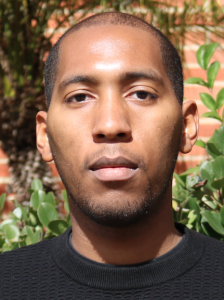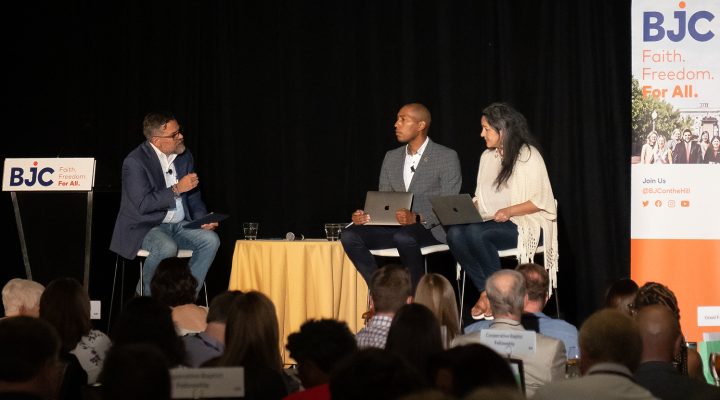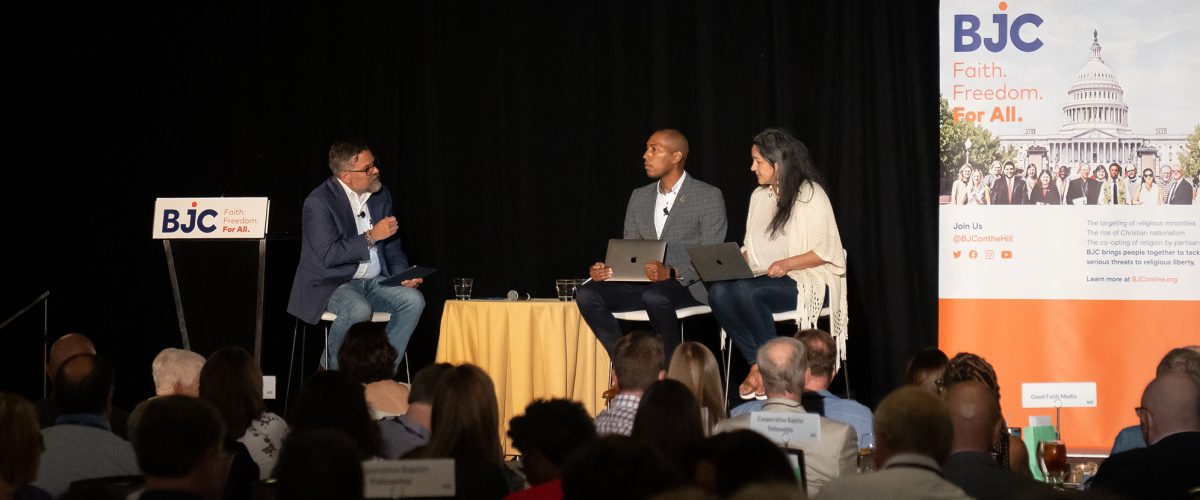Native Americans continue to be oppressed by the Doctrine of Discovery and other entrenched, historic narratives used to rationalize the subjugation of indigenous peoples, panelists said during a Baptist Joint Committee for Religious Liberty event in Dallas June 30.
“Colonialism, for us, has not ended at all. We are still living in occupied territory,” said Kyle T. Mays, an Afro-Indigenous Saginaw Chippewa writer and scholar.
He was joined on the luncheon panel by Mariah Humphries, a citizen of the Mvskoke Nation and a writer and educator who serves on the board of Texas Baptist Women in Ministry. Good Faith Media CEO Mitch Randall moderated the discussion held during the Cooperative Baptist Fellowship’s 2022 General Assembly.
BJC referenced an example of the modern-day persecution of indigenous people with table literature seeking support for its #SaveOakFlat campaign and a letter urging Congress to pass the Save Oak Flat Act. Listed on the National Register of Historic Places, Oak Flat is an ancient burial site in Arizona’s Tonto National Forest. The federal government is set to grant the land to a copper mining company despite being sacred to Apache and other tribes.

Mariah Humphries
In another setback for Native Americans, the U.S. Supreme Court on June 29 voted 5-4 to allow states to prosecute crimes committed by non-natives on reservations, chipping away at the sovereign status of tribal lands.
But the subjugated status of indigenous Americans also is expressed in the dehumanizing treatment of Native American women in U.S. law, Humphries said.
Reauthorizations of the Violence Against Women Act typically have required vigorous action to include protections of Native American women from crimes committed on reservations by non-indigenous assailants, she explained.
And sexual assaults and other violence against Native American women occur at such higher rates that the term MMIW —Missing and Murdered Indigenous Women — has been coined to track the phenomenon. “It’s tragic and it should make us all uncomfortable,” Humphries said.
Policies oppressing indigenous people have their origins in theologies dating back at least to the Crusades and were formally established by papal decree in 1493. Known as the Doctrine of Discovery, the edict granted Spain the religious cover to take possession of the territories and people it encountered through colonization, said Mays, an assistant professor of history and African American and American Indian studies at UCLA.
“It declared war on all non-Christians” who were depicted as savages in need of salvation and deserving of being dispossessed of their land and persecuted by the occupiers, he said. “It’s about conquering and giving Christians the right to do so.”

Kyle T. Mays
In the United States, the concept became known as Manifest Destiny, which declared the nation’s divine mandate to expand across the North American continent. The doctrine later informed the U.S. Supreme Court’s 1823 Johnson v. McIntosh ruling, which declared that Native Americans are merely occupants, not owners, of the reservations provided by the federal government.
“Manifest Destiny was a God-given right to take lands from indigenous peoples,” Mays said.
The genocide perpetrated against Native Americans also targeted their character — by calling them “heathens” — and their histories, customs, dress and way of speaking, Humphries said. “The Native American way of life, all of a sudden, is oppressed and a language and a culture are destroyed.”
The attack on indigenous culture also came in the form of boarding schools operated by the Bureau of Indian Affairs beginning in the 1860s, Humphries said. “Hundreds of thousands of children were forcibly removed from their homes and placed into schools in other states and other regions.”
She added that the schools were sectarian but funded by taxpayer dollars, illustrating again how religion is used as “a green light to kill and destroy by government.”
Related articles:
Columbus Day or Indigenous Peoples’ Day? The damaging Christian ‘Doctrine of Discovery’ at the heart of the American identity crisis | Opinion by Robert P. Jones
It’s past time to unearth and acknowledge our role in Native American boarding schools | Analysis by Laura Ellis


